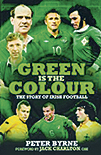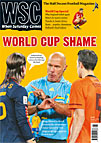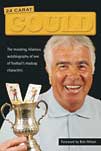 The story of Irish football
The story of Irish football
by Peter Byrne & Matthew Murray
Carlton Books, £14.99
Reviewed by Ciaran McCauley
From WSC 305 July 2012
It is hardly surprising given the island’s turbulent history, but football in Ireland has never been a simple matter. Just take the eligibility issue, which has dominated relations between football authorities north and south in the past few years. James McClean’s selection for the Republic’s Euro 2012 squad, and a few brainless morons issuing death threats on Twitter, made headline news once again and stirred up the usual hornets’ nest.
The Irish who-can-play-for-who furore illustrates two key points. Firstly, relations between the Irish Football Association (IFA) and Football Association of Ireland (FAI) rarely appear anything other than frosty.
Secondly, what the hell happened for things to get this way? In a country where every other sport is happily played on an all-Ireland basis, why does football suffer the indignity of such tension?
Into this knowledge breach steps Peter Byrne’s Green Is The Colour, perhaps the first authoritative overview of the history of the two associations.
Taking the origins of football in Ireland as its starting point, the book outlines the formation of the IFA in Belfast – the world’s fourth oldest football association – and its running of the game in Ireland before the disgruntled Leinster Football Association broke away to form the FAI just days after the partition of Ireland in 1921.
Neatly illustrating the symmetry between Ireland’s political strife and the football power struggle, Green Is The Colour goes on to outline nimbly decades of squabbling between the two associations over everything from who could pick what players (eligibility again) and even who had the right to call themselves Ireland in international games.
These early decades make up a large portion of the book, with Byrne’s scrupulous research offering invaluable insight into the power plays at work between two associations fighting desperately for control of the game.
The writer clearly appreciates the difficulties in overseeing the growing sport in a country struck by sectarian divisions and never lets his academic eye for detail get in the way of a good anecdote – for instance, his eye-opening account of the Irish Free State taking on Germany in 1939, the Nazi state’s final football match before the war.
If anything, the book is too ambitious. Despite being packed with information, it feels light in some areas and Byrne largely skips over the more well-known modern days. But he spends large chunks looking at the FAI’s struggles, notably in taking on the fiercely nationalist Gaelic Athletic Association which was against “British” games. This is excellent material but it leaves this ostensible history of the game on both sides of the border with a distinct slant to the South.
Nonetheless, Green Is The Colour remains a fascinating account of how football related to one of the 20th century’s most enduring local conflicts. A must-read for all Irish supporters and highly recommended for anyone with an interest in the tantalising contradictions of how football, the great unifier, has always been divided on the island.


 by Bobby Gould and David Instone
by Bobby Gould and David Instone